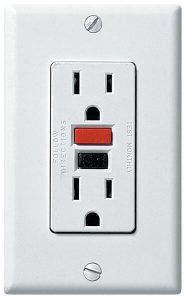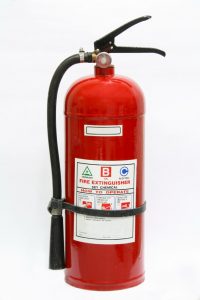Pool Party
Ever been swimming at night in your local pool? Then you know that underwater lighting helps make it fun. But you know water is a good conductor of electricity, right? So, why don’t we get shocked or electrocuted when electrical lighting is submerged under water?
 Experts explain that there are two main ways to light a pool safely. The method used most is called “wet niche lighting.” Very bright hot-burning bulbs throw huge beams of light to make a pool look inviting on a hot night. Water never actually touches the electrical parts of the lighting system. The bulb, wiring, and the cable that encloses the wiring are all permanently sealed against water with a material that does not conduct electricity.
Experts explain that there are two main ways to light a pool safely. The method used most is called “wet niche lighting.” Very bright hot-burning bulbs throw huge beams of light to make a pool look inviting on a hot night. Water never actually touches the electrical parts of the lighting system. The bulb, wiring, and the cable that encloses the wiring are all permanently sealed against water with a material that does not conduct electricity.
Wet niche lighting bulbs burn so bright and hot that they can only be used under water. They need the water to cool them constantly when they are turned on. If they are turned on outside of water, these bulbs burn out immediately.
Fiber optic lighting is the second method to light swimming pools safely. It is expensive and not often used in local or backyard swimming pools. In fiber optics, light is transmitted down a thread or cable of transparent material that reflects light well, such as plastic or glass. The fiber glows with light, and the light follows the fiber however it bends or curves. It is as if beams of light traveled through a tunnel by bouncing off millions of tiny mirrors!
One reason that fiber optic lights are so good for swimming pools is that the electricity that supplies the light can be far away from the water, so there is no chance of water accidentally touching live wires and causing a shock.
Fiber optic lighting can be used creatively to make effects that are beautiful and fun. Designers have fun using these flexible fiber optic tubes and cables of light to outline and decorate pools and other outdoor areas. Maybe one day you’ll use it to spell out your name in lights at the bottom of your own backyard pool! Cool!
Electricity + Water = Danger
-
- Make sure your hands are dry before you touch anything electrical, even if you think it’s turned off. Keep electric cords and appliances away from water, and unplug appliances before cleaning them.

- Use only a battery-powered radio or boom box near a swimming pool or other wet area.
- If you see someone using electricity near water, remind them to plug their appliance or equipment into a GFCI-protected outlet or to get a portable GFCI (ground fault circuit interrupter). These devices monitor the flow of current to and from an appliance. If more current is flowing to an appliance than coming back, it means that some is traveling to the ground—perhaps through you—and the GFCI will quickly cut power to prevent a serious shock. These devices are also known as GFIs (ground fault interrupters).
- Never use water on an electrical fire. Use a multipurpose fire extinguisher instead.
Don’t Mix Water and Electricity
 If an appliance catches fire, your first reaction might be to throw water on it. DON’T DO IT! Water conducts electricity. Any electricity still flowing through the appliance can travel up the stream of water and shock you.
If an appliance catches fire, your first reaction might be to throw water on it. DON’T DO IT! Water conducts electricity. Any electricity still flowing through the appliance can travel up the stream of water and shock you.
Keep in mind, too, that not all extinguishers are made to be used on electrical fires. Extinguishers rated A are for wood, paper, and cloth; those rated B are for combustible liquids like gasoline. Use an extinguisher with a C rating (most household extinguishers are rated C), which can be safely used on all fires, including electrical. Do you know where the fire extinguisher is in your house?
Advanced Science Concept
Fantastic Facts
- What are those little boxes on hair dryer cords? In the early 1980s there were about 18 deaths a year caused by hair dryers falling into bathtubs or sinks filled with water. Since 1991, hair dryer manufacturers have been required to include GFCIs on the dryer cords. The number of hair dryer related deaths has dropped to an average of two per year.
- Why are sharks such good hunters? A shark’s senses are so acute it can detect the electrical impulses produced by the bodies of other underwater animals. The fact that water is a good conductor of electricity makes it possible for sharks to use this electrical sixth sense to hunt prey.
- Do fish ever get struck by lightning? Because water conducts electricity, when lightning strikes water it spreads out along the surface. Any fish near the surface of the water get electrocuted.



 A ground fault occurs when electricity travels outside an intended path and tries to get to the ground by the shortest route. If you touch electricity while you are grounded (touching the ground or something resting on the ground, like a ladder), your body becomes electricity’s shortest route to ground. You could also become part of electricity’s path to ground if you touch water that touches electricity. In either case, you could be hurt or even killed.
A ground fault occurs when electricity travels outside an intended path and tries to get to the ground by the shortest route. If you touch electricity while you are grounded (touching the ground or something resting on the ground, like a ladder), your body becomes electricity’s shortest route to ground. You could also become part of electricity’s path to ground if you touch water that touches electricity. In either case, you could be hurt or even killed.